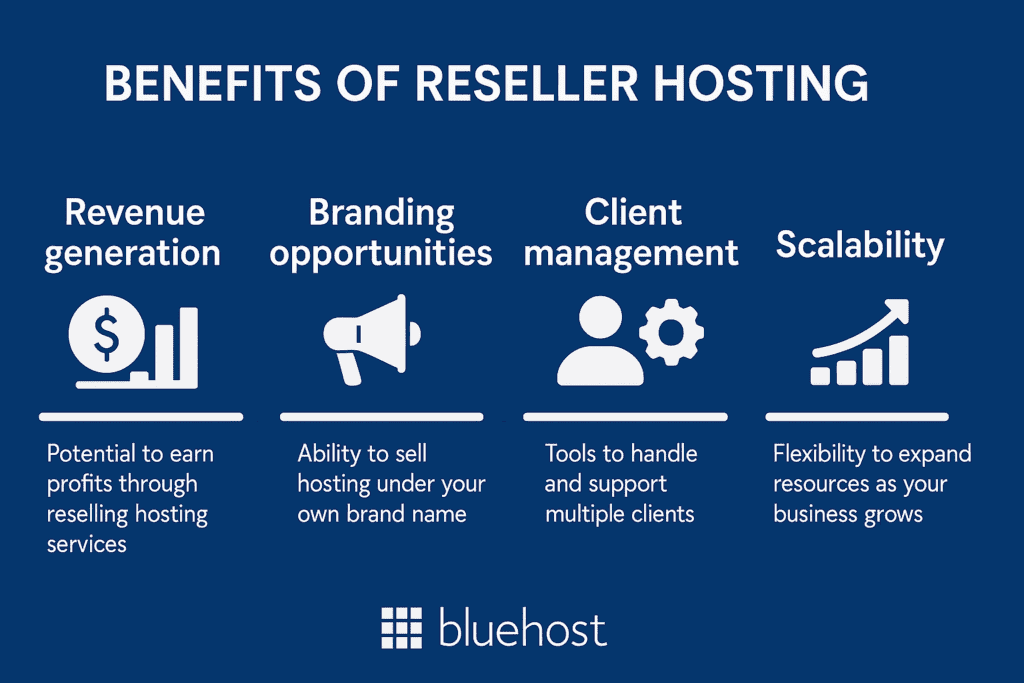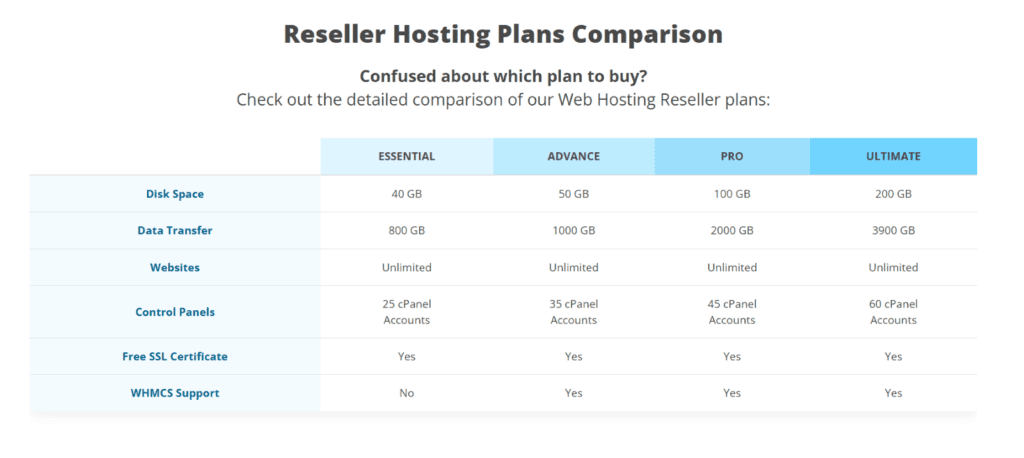Key highlights
- Understand what is reseller hosting and how it allows you to launch your own branded web hosting business without managing servers.
- Learn how reseller hosting works by dividing server resources into custom client accounts with full control over pricing and features.
- Explore the benefits of reseller hosting including recurring revenue, white-label branding and simplified client management.
- Discover essential features to look for in a reseller hosting plan such as WHMCS billing tools, white-label support and 24/7 technical assistance.
- Get step-by-step guidance on starting out with ResellerClub and building a scalable hosting business.
Ever thought about starting your own web hosting business without managing servers or dealing with complex backend setups? That’s exactly what reseller hosting allows you to do. Now the question is what is reseller hosting?
Reseller hosting is a type of web hosting that lets you buy server resources from a provider and resell them to your own clients under your brand name. You don’t need to own any hardware or handle server maintenance. Instead, you manage customer accounts, set your own prices and offer hosting as if it were your own service.
In this guide, you’ll learn how reseller hosting works, what makes it a smart income stream for freelancers and agencies and the steps to start your own hosting business.
Let’s dive in.
What is reseller hosting?
Reseller hosting is a hosting service designed for individuals or businesses who want to provide web hosting services to their own clients. It allows you to purchase server space and resources in bulk from a web hosting provider and then resell these resources as customized reseller hosting plan.
Essentially, it’s a way to create your own web hosting business without needing to manage the technical aspects of servers and infrastructure.
Reseller hosting is different from other hosting types because it’s built for selling, not just hosting your own website. You get tools to manage customer accounts, offer branded hosting packages and set your own prices.
How reseller hosting compares to other hosting types?
Choosing the right hosting model depends on your goals. Here’s how reseller hosting stacks up against shared, VPS and dedicated hosting options:
| Feature | Reseller hosting | Shared hosting | VPS hosting | Dedicated hosting |
| Purpose | Sell hosting to clients under your brand | Host personal or small business websites | Host resource-heavy websites with more control | Host high-traffic or custom apps with full control |
| Account control | Multiple cPanel accounts for clients | Single cPanel for all sites | One control panel for single-user environments | Full root access and server-level control |
| Resource allocation | Shared but divided per client plan | Shared with other users | Dedicated virtual slice of a server | Entire server dedicated to one user |
| Scalability | Moderate (upgrade within reseller plans) | Limited | High scalability with flexible upgrades | Very high, but expensive to scale |
| Ideal for | Agencies, developers, freelancers, startups | Beginners, bloggers, personal sites | Growing businesses or developers | Large businesses and enterprise-level projects |
| Customization | Moderate (branding, pricing, client plans) | Very limited | High (software and configuration flexibility) | Full customization including hardware choices |
| Server management | Handled by provider | Handled by provider | Partially managed (depends on plan) | Fully managed by user or as a paid add-on |
| Cost | Mid-range | Low-cost | Higher than shared, affordable for scaling | High initial and ongoing cost |
Reseller hosting offers a strong middle ground perfect for those who want to launch a hosting reseller program or add client hosting to their services. It combines flexibility and control without the complexity of managing servers yourself.
Now that you know what is reseller hosting, let’s break down how it functions-from buying server resources to managing individual client accounts.
This section also clears up common questions about reseller web hosting and how it fits into the broader hosting landscape.
How does reseller hosting work?
Reseller hosting works by letting you buy a large block of server resources from a provider and then split them into smaller accounts. You can then resell these accounts to clients under your own brand. This structure allows you to create and manage separate hosting environments for each client without owning the physical server.
With a reseller hosting account, you manage client-specific features like:
- Storage and bandwidth allocation based on usage needs
- Email accounts and domain assignments
- Account-level access through tools like Web Host Manager (WHM) and separate cPanel dashboards
This setup allows you to tailor packages for different clients. For example, an eCommerce client may need more bandwidth and email accounts, while a small business website may need only the basics.
What sets reseller hosting apart is its customization and branding flexibility. Many reseller hosting plans allow you to add your business name, logo and brand identity across control panels, dashboards and support communications. This white-label feature helps you build trust while presenting a seamless, professional experience to your clients.
As your client base grows, you can scale your resources without changing platforms. Your hosting provider handles server maintenance, uptime and security while you focus on sales, support and customer satisfaction.
With the core functionality covered, let’s now examine the key business benefits that make reseller hosting a practical and scalable solution.
What are the benefits of reseller hosting?
Reseller hosting helps you earn recurring revenue and build your own hosting brand without managing servers. It’s a smart way to grow your business with minimal overhead.
Here are the key benefits of starting a reseller hosting business:

1. Revenue generation
You can create and sell custom hosting packages at your own prices. This allows you to earn recurring income from every reseller hosting account you manage.
Here’s how you can generate consistent revenue:
- Offer packages at wholesale prices and earn profit margins
- Build monthly revenue by reselling web hosting services to multiple clients
- Monetize your existing client base with minimal cost by bundling hosting into your service offering
For example, a freelance web designer can include hosting in their website package, turning a one-time project into a monthly income stream.
2. Branding opportunities
You run the entire hosting service under your own brand-not the provider’s. This gives you full control over how your business is presented.
Here’s how you can create a fully branded hosting experience:
- Customize control panels, domain names and hosting plan labels
- Present yourself as a professional hosting provider, not just a third-party service broker
For example, agencies often add their logo to client dashboards and use branded email notifications to build trust and consistency across services.
3. Easy client management
Reseller hosting simplifies day-to-day client handling by giving you the tools to manage multiple accounts without hassle. Using WHM and separate cPanel access, you can maintain control while offering clients a smooth experience.
Here’s what you can manage from one place:
- Multiple customer accounts with isolated logins and configurations
- Server resources allocation like storage, bandwidth and email limits
- Client-facing support, while the provider handles backend issues
For instance, a digital agency can manage hosting for 10+ clients from one dashboard without juggling separate logins or backend setups.
4. Business scalability
You can start with a basic reseller plan and scale as your client list grows. Most providers offer flexible plans that grow with you-so you only pay for what you use.
Here’s how reseller hosting supports business growth:
- Expand hosting resources as needed with upgraded plans
- Avoid infrastructure costs by relying on the provider’s servers
- Serve more websites and clients under your brand without changing platforms
Say you’re a freelancer starting with 3 clients. As you add more, you can upgrade your plan instantly with no migration or downtime involved.
What features should you look for in a reseller hosting plan?
You should look for reseller hosting plans that include client management tools, white-label branding and strong security. These features help you run a smooth and scalable reseller hosting business.
Here are the essentials to check before choosing a best reseller hosting provider:
1. WHMCS or billing tools
A reliable billing system is critical for managing customer payments, automating renewals and streamlining operations. The right tools let you stay organized and eliminate the need for manual tracking.
Here’s what to look for:
- WHMCS integration or other built-in billing platforms included in your reseller plan
- Automated features like invoicing, account provisioning and subscription renewals
- Revenue tracking to monitor income from each active reseller hosting account
2. White-label capabilities
White-label features let you offer hosting under your brand name instead of your provider’s. This is essential if you want to build trust, appear professional and fully own the customer experience.
Key white-label options to look for:
- Custom branding for control panels, login screens and emails
- Custom domain and plan names to align with your brand identity
- Client-facing experience that makes your service look like an independent hosting company
3. Security, backups and support
Strong security and reliable support help ensure uptime and protect your client websites. These features allow you to focus on business growth while your provider takes care of backend performance.
Make sure your plan includes:
- Free SSL certificates for encrypted data and trusted site status
- Daily backups and malware protection to keep client data safe
- 24/7 technical support to handle critical server-side issues on your behalf
These features form the backbone of a trustworthy and scalable web hosting business. Choosing the right reseller hosting plan ensures you can focus on growth while your hosting infrastructure stays reliable.
Once you understand the benefits and must-have features, the next step is turning knowledge into action.
How to get started with reseller hosting?
Starting a reseller hosting business doesn’t require technical expertise or large upfront investments-it simply requires the right tools and a reliable platform.
The best reseller hosting setup gives you control, flexibility and room to grow, all while taking care of the heavy lifting behind the scenes. That’s where choosing the right provider becomes crucial.
To help you launch with confidence, Bluehost recommends ResellerClub, a trusted name in the web hosting industry known for its powerful features and reseller-friendly infrastructure.
Here’s a step-by-step guide to launching your reseller hosting business:
1. Sign up with ResellerClub

ResellerClub is a trusted name in the web hosting industry and offers Linux-based reseller hosting plans. It is packed with key features like:
- WHM and cPanel access to manage client accounts
- Free WHMCS license for automated billing and account setup
- White-label support for full branding control
- SSD storage for faster website performance
- Unlimited websites, emails, subdomains and MySQL databases
- Softaculous with 400+ one-click app installs
- Free SSL certificates and 24/7 technical support
These tools give you everything you need to operate as a professional reseller hosting provider.
2. Set up hosting plans and pricing

Using WHM, you can create custom reseller hosting packages that fit different client needs.
For example:
- A starter plan may offer 10 GB SSD storage, 1 domain and 5 email accounts.
- A premium plan may include 50 GB SSD storage and support for unlimited domains and emails.
Structure your pricing to balance affordability with value. Offer multiple tiers to appeal to freelancers, agencies and small businesses.
Read more: Reseller Hosting Plans Comparison
3. Apply your branding
ResellerClub’s white-label features let you create your own hosting brand with full control over how your services appear to clients.
Here’s how you can personalize the client experience:
- Replace the provider’s name with your own logo and domain
- Customize the control panel, login screens and email templates
- Ensure consistent branding across all client-facing touchpoints
This builds credibility and helps you stand out as an independent web hosting company.
4. Manage clients and billing
ResellerClub includes a free license for WHMCS, which handles all billing and account management tasks.
With WHMCS, you can:
- Automate new account creation after purchase
- Generate and send invoices
- Manage subscriptions, renewals and upgrades
- Accept payments via PayPal, Stripe and other gateways
This system streamlines your operations and gives clients a smooth onboarding experience.
Still wondering if reseller hosting is right for you? This section helps you decide by highlighting who benefits most from this model.
Who should consider reseller hosting?
Reseller hosting is ideal for anyone looking to enter the web hosting industry or add hosting services to an existing business. It’s especially useful for professionals and businesses managing multiple websites or clients.
Here’s who can benefit the most from a reseller hosting plan:
1. Web designers and developers
Reseller hosting allows you to bundle hosting services with design or development projects. This creates a seamless experience for clients, who won’t need to find a separate hosting provider. Offering hosting as part of your package strengthens client relationships and adds revenue.
2. Digital agencies and freelancers
For agencies or freelancers, adding web hosting services to your offerings can enhance your brand and expand income streams. Reseller hosting lets you manage client accounts, provide customized hosting packages and keep everything under your own brand name. This added control increases your credibility as a service provider.
3. Entrepreneurs seeking a business opportunity
For those interested in starting a web hosting business, a right reseller hosting company can provide an affordable entry into the web hosting market. It enables you to offer branded hosting plans without managing server hardware, making it a cost-effective way to enter the hosting industry.
4. Businesses with multiple websites
If you manage multiple websites, reseller hosting allows efficient organization and resource allocation. It’s a centralized way to oversee each site while keeping costs manageable, especially for businesses needing hosting space for various projects.
What are the common use cases for reseller hosting?
Reseller hosting is more than just a way to make money; it’s a versatile solution that fits various business models. If you already understand what is reseller hosting and how it works, you’re ahead. Now, see how different professionals use it to add value, simplify operations and earn steady income.
Here are some of the most common use cases:
1. Agencies offering hosting with web design services
Use case: Web design and development agencies often bundle hosting into their service packages.
Why it works:
- Clients get everything under one roof design, development and hosting.
- Agencies retain long-term relationships by offering monthly or yearly hosting contracts.
Example:
An agency designing small business websites can upsell hosting plans for added convenience. Instead of referring clients to third-party providers, they manage hosting internally and brand it as their own.
2. Entrepreneurs creating niche hosting brands
Use case: Entrepreneurs use reseller hosting to launch niche-focused hosting businesses. For example, hosting specifically for photographers, local businesses or bloggers.
Why it works:
- You can create targeted hosting plans with features tailored to a specific audience.
- White labeling allows full branding freedom to build a recognizable business.
Example:
An entrepreneur could start a hosting brand called “FitnessHost” targeting personal trainers and fitness bloggers with plans optimized for online booking tools and video content.
3. WordPress consultants and freelancers reselling hosting
Use case: WordPress professionals offering custom setups or website maintenance can also offer managed hosting through reseller accounts.
Why it works:
- They maintain control over performance and compatibility.
- Clients trust the consultant to handle technical details, including updates and backups.
Example:
A freelance WordPress consultant may offer “care plans” that include hosting, updates, backups and security all hosted under their own reseller account with client-specific resource allocation.
Final thoughts
Reseller hosting isn’t just a feature-it’s a real business opportunity. You can offer branded hosting solutions to your clients and generate steady, recurring income.
You control the pricing, support and packaging-all under your own name. It’s a simple, low-risk way to enter the web hosting market with high-reward potential.
Looking for reseller hosting that supports your business goals? Bluehost recommends ResellerClub – a trusted platform packed with powerful tools to help you build and scale your hosting brand.
Visit Bluehost to get everything you need to build, manage and grow your web business.
FAQs
Reseller hosting is a web hosting service where you purchase server resources from a hosting provider and resell them under your own brand. It enables individuals or businesses to offer hosting services without managing the web server or backend infrastructure.
Reseller web hosting is used to create and sell custom web hosting packages to clients. It is popular among web developers, web designers, digital agencies, and entrepreneurs who want to offer hosting services or start a hosting business with minimal technical overhead.
Reseller hosting provides access to a large block of server resources that you allocate to multiple hosting accounts. You manage these accounts using tools like WHM and cPanel, while the hosting provider handles server maintenance, uptime, and robust security features.
Yes, reseller hosting is profitable, as it allows you to create custom hosting packages at competitive prices. You earn recurring revenue by reselling hosting services to more customers under your own brand, with minimal extra cost and no need to manage a physical server.
The primary difference is that shared hosting provides a single account for hosting a single website, whereas reseller hosting enables you to create multiple hosting accounts for other customers. Reseller hosting includes white label reseller features, custom pricing tiers, and full control over hosting packages.
Managed reseller hosting means that the provider handles server management, software updates, security, and performance optimization. This allows resellers to focus on growing their business, setting their own pricing, and supporting customers without incurring technical overhead.
It ensures expert support, robust security features, and reliable uptime, making the hosting platform scalable as your business grows.
To start a reseller hosting business, choose a reputable reseller hosting provider that offers scalable plans with white-label capabilities and a comprehensive ticketing system. Purchase a reseller hosting plan, set up your website with custom hosting packages, and integrate site tools for billing and client management.
Promote your service portfolio to attract clients, set your own pricing, and start selling hosting services under your own brand.
Reseller domain hosting lets you register, manage, and resell domain names alongside hosting services. With domain management tools included in many reseller hosting plans, you can offer clients a wide range of domain options and streamline billing through your control panel. This expands your service portfolio and enhances customer convenience.
Top reseller hosting providers offer reliable infrastructure, strong security features, and scalable resources. They provide user-friendly management tools, such as WHM and cPanel, white-label branding, and 24/7 expert support.
Leading providers such as ResellerClub, Bluehost, and 20i are known for competitive pricing and reseller-friendly plans that help you build a professional web hosting business.
Key features to prioritize in reseller hosting plans include:
– White-label capabilities to fully brand your hosting services
– Integrated billing tools like WHMCS for automated invoicing and account management
– Robust security with free SSL certificates, daily backups, and malware protection
– Unlimited reseller hosting with scalable storage, bandwidth, and hosting accounts
– Customizable resource allocation per client account
– Intuitive control panels for both resellers and clients
– Reliable 24/7 technical support from the hosting provider’s support team
Reseller hosting costs vary based on provider, plan features, and resource limits. Entry-level plans typically start around $15–$20 per month, while advanced plans with more storage, bandwidth, and hosting accounts range from $40 to $100+ monthly.
Many providers include free SSL certificates and offer discounts for annual billing. Additional costs may include domain registration and third-party billing software if not included.
Reseller hosting is secure when offered by reputable providers with robust security measures. These include free SSL certificates for encrypted connections, daily backups, malware scanning, firewalls, and proactive server monitoring.
The hosting provider manages server-level security, while you can implement client-specific protections. Selecting a reseller hosting plan with strong security features safeguards your clients’ websites and data.



Write A Comment